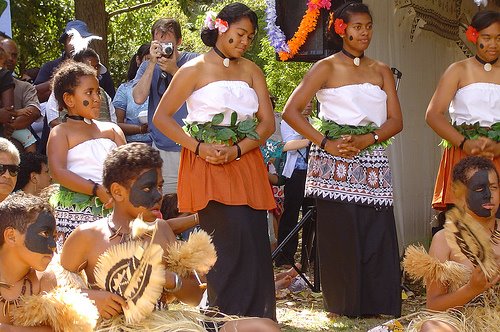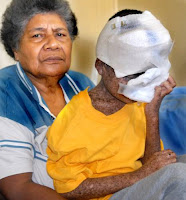 Aporosa was teaching in a classroom in Kadavu when he started to feel doped from a late night of too much grog. He became acutely aware that he was still intoxicated, and that this affected his concentration, motivation, and that he wanted to sleep more than do his job, which was to impart education to the students.
Aporosa was teaching in a classroom in Kadavu when he started to feel doped from a late night of too much grog. He became acutely aware that he was still intoxicated, and that this affected his concentration, motivation, and that he wanted to sleep more than do his job, which was to impart education to the students. This prompted him to question the effectiveness of other teachers following yaqona consumption, and to consider whether a link existed between the high under-achievement rate of students in Fiji and heavy yaqona drinking.
Aporosa is the Fijian name this part European traveller Shane was given by his part Fijian mother, a Robinson with links to the chiefly village of Naduri in Macuata.
Abo, as he is affectionately known has been doing his own experiments on the effects of yaqona on education. He has gone to the extreme with a plantation in Rauni, a piece of land in the scenic backdrop behind Richmond Methodist School in Kadavu.
So he conducted his experiment on whether there was a link between poor education delivery by teachers and their consumption of yaqona. Abo found that academic comment concerning yaqona's influence on education delivery was limited, although informal debate and discussion was widespread.
He found that some have even blamed traditional practices associated with the use and consumption of the beverage as a major reason for under-achievement in Fijian education. Shane took a sample of 38 teachers, Ministry of Education staff, academics and education stakeholders were surveyed and interviewed using a structured questionnaire and semi-formal interviews.
He found yaqona, a soporific intoxicating beverage, played a vital cultural and economic role in the rural educational arena and research participants confirmed that the over-consumption of yaqona by some teachers, both during and after school hours, was having a negative impact upon their ability to adequately deliver education to their students.
"Additionally, a number of factors were identified that I argue contribute to the over-consumption of yaqona by teachers in the rural teaching environment. "These include the cultural significance of yaqona, ceremony and presentation, the State/ community education delivery partnership, limited extra-curricula activity, the ethos of vakaturaga, obligation, bole (a non-aggressive form of competitive consumption), kinship, and masculinity.
"Despite these factors, I argue that the complete removal of yaqona from the school campus would be both impossible and detrimental, threatening limited financial resources and the State/community partnership, which is vital to the systems of rural education delivery; together with diluting culture, identity, and notions of self-worth, and therefore perpetuating under-achievement," he said.
It must be noted that while this study has concentrated on one particular research site, Richmond Methodist High School (RMHS), Kadavu, this does not single out any particular educational environment, religious association, or governance structure as being more liberal or restrictive in its approach to yaqona within its education delivery systems.
Aporosa said cultural practices surrounding yaqona at the research site are comparative with most rural Fijian school contexts. "Moreover, as with most semi-autonomous structures, certain practices tend to manifest to greater or lesser degrees.
"For example, two yaqona related experiences, occurrences that could potentially be deemed as amounting to serious professional misconduct, were observed at other secondary schools elsewhere in Fiji, and such behaviours have not been observed during the 400 plus days I have lived at RMHS over the past seven years."
Aporosa said he had been a regular consumer of yaqona for seven years, has a small yaqona farm at Natokalau, Kadavu, and an interest in the etiquette and culture surrounding its use. However, equally alarming in his findings was that only two brief comments linked yaqona consumption and education delivery. One from the Ministry of Education (MoE) which stated in its 515 page 2000 Fiji Islands Education Commission report entitled Learning Together: Directions for Education in the Fiji Islands, "Many teachers in rural areas also become involved in excessive yaqona consumption, with the result that they are less effective in their professional work. Instances have been cited where teachers leave classes unattended while they drank yaqona".
The other comment from a group of researchers from the Department of Education and Psychology at the University of the South Pacific, and the Ministry of Education, which visited Koro schools in 1994-5. Their report stated that yaqona has the "ability to sap energy and support listlessness and there can be little doubt that it substantially inhibits performance of duties in non-traditional professional environments, including the civil service and teaching."
The researchers asked that "individuals in the education service appraise the degree of moderation they bring to the habit, given the other demands on their intellectual powers, and perhaps to take a more parsimonious view of the amount of kava that might appropriately be imbibed at social gatherings"
Abo has found that while Mediherb 9, a professional newsletter produced for companies licensed to distribute herbal medicines, recommends a maximum daily dose of 200mgs of kavalactones, one standard cup can contain 247 mgs of this.
"Following the consumption of one bilo of yaqona, it can take up to nine hours for the kavalactones to reach maximum effect in the body," his research states. "This is because of the time it takes for the kavalactones to pass from the stomach into the bloodstream.
"Food eaten during, or after consumption, can disrupt this time period. It has been determined that the intoxicating effects of yaqona continue to work well after consumption ceases." The study goes in hand with a directive issued by Permanent Secretary for the Public Service Commission Taina Tagicakibau but still yet to be followed by a number of odd government schools and other schools in the country.
The findings of Shane's study are his own but they do confirm what many people already know about yaqona yet fail to address. But you should also understand that Shane does drink yaqona and he has even been to the nakamals in Vanuatu where it is drunk in stiff concentrations but in small amounts - three baby bowls can be the equivalent of any Fijian baby mix - so to speak.
Yaqona does affect productivity in some way or even directly - if you are sleeping during work.
Fijian Teachers Association secretary Maika Namudu said teachers should reduce grog consumption and stop drinking yaqona in schools. "This will keep their mentality sharp so they can teach properly," he said.
"When a person consumes too much yaqona their nervous system gets numb and this affects their alertness. "Hence we ask our teachers to review the way they consume yaqona." Mr Namudu said when a teacher is badly affected by grog consumption their productivity will drop and this will affect students under their charge
"It is not very professional when you see it from a practising teacher's point of view," he said.
"Yaqona should be taken at moderate levels - the best way is to do it during the weekend and stay alert throughout the week. People in rural areas should be aware that parents are watching that lowers the esteem of civil service in general."
Yet kava continues to be consumed in many hidden kitchens and classrooms of our government offices. It may be the reason for the low productivity that some officers are capable of. It may hold the key behind why Fijian students are lagging behind in their studies compared to their Indian counterparts.
Adapted from Fiitimes Online









